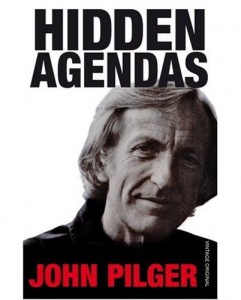Note: This is the first book review I’ve written, so please forgive any beginners mistakes I make!
I have spent the last few months watching journalist John Pilger’s television documentaries, having first discovered his film-making through the 2007 award-winning “The War on Democracy”, an excellent account of US greed and it’s effects on Southern and Central America, including the events surrounding the US-backed coup d’état against Venezuelan leader Hugo Chavez in 2002 and many other instances of US involvement in attempts to overthrow democratically elected governments around the world.
I became hooked on his work after purchasing “Documentaries which Changed the World”, the first DVD box set of his films, and have since snapped up the rest of the DVD’s. These include some classics ranging from ‘Burp’, which chronicles the history of the ‘ice cold war’ between Pepsi and Coke, ‘The New Rulers of the World’ examining the effects of globalisation on Asia, and ‘Stealing a Nation’ which tells the tragic story of the Chagos islanders, expelled from their homeland in the 1970’s by the British government, the Chagos having been given to the US in order for them to build a military base on the largest island, Diego Garcia.
 I recently finished reading his 1998 book ‘Hidden Agendas’, a collection of essays on many subjects, some now outdated although many just as relevant today as when they were first written. Pilger states that he lives by the Claud Cockburn quote, ‘Never believe anything until it is officially denied’ and it certainly shows in all of his books and documentaries. Despite the dangerous places the ventures to, he remains determined to uncover the facts at all costs.
I recently finished reading his 1998 book ‘Hidden Agendas’, a collection of essays on many subjects, some now outdated although many just as relevant today as when they were first written. Pilger states that he lives by the Claud Cockburn quote, ‘Never believe anything until it is officially denied’ and it certainly shows in all of his books and documentaries. Despite the dangerous places the ventures to, he remains determined to uncover the facts at all costs.
In his chapter on the Gulf war, Pilger shows how manipulation of the media during the conflict helped to steer the journalists in the right direction, encouraging them to focus on the new ‘high-tech weapons’ and the miraculously low US and UK casualties, therefore largely ignoring the hundreds of thousands of civilian deaths which occured during the conflict. Pilger also covers the devastating impact that the sanctions against Iraq had on the civilian population.
In the section on the Indonesian invasion of East Timor in 1975 Pilger exposes not just the complicity of the UK government in the mass slaughter of civilians, but also that British manufacturers were arming the Indonesian army. The story of the Ploughshares and their acts of ‘military conversion’ using only hammers to destroy hawk jets destined for delivery to Indonesia was heartening, and showed that direct action against arms suppliers can be successful, their trial and subsequent aquittal can only reinforce this.
One of the most memorable sections is the two chapters on Burma and it’s brutal military regime, here Pilger’s reporting is undercover and has to be remain low-key to avoid detection by the authorities. Some of the interviews with ordinary citizens, although sometimes cut short, provide a fascinating insight into their lives under the Junta and just how bad things have gotten for them, as the west turns a blind eye to western oil and gas companies reaping the profits of Burma’s natural resources, being extracted via forced and even child labour. His interview with Burma’s elected leader in exile, Nobel Peace prize winner Aung San Suu Ki is deeply moving and shows the determination within Burma’s ‘National League for Democracy’ to return to a democratic system of government.
Chapters on the British media (including the rise of PR) and the docker’s strikes in the 80’s certainly filled gaps in my knowledge of issues so close to home, and gave excellent examples of how a monopoly over the mass-media can be abused and used to mould public opinion in any way imaginable.
In his writing and documentaries, Pilger joins Noam Chomsky in successfully exposing the depth of the government and media manipulations of the truth, challenging the ‘official’ and established versions of events. He opens your eyes to what is really going on around you, without a hint of scaremongering, and I highly recommend anyone interested in world affairs to purchase Pilger’s books and DVD’s right away, with “Documentaries which Changed the World” being an excellent starting point for further exploration of his work.
One Comment
[…] my last in-depth book review back in February I thought I would quickly write up what else I have been […]